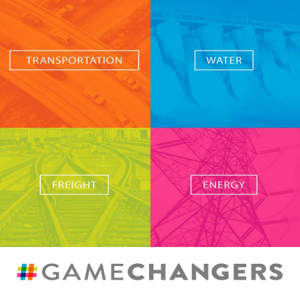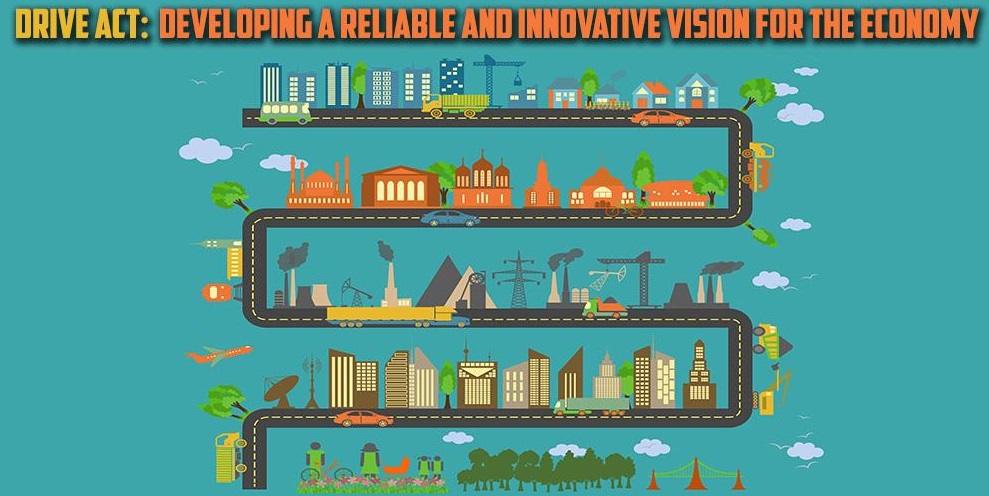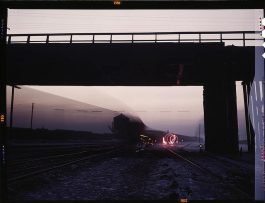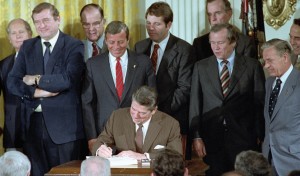Infrastructure That’s Changing the Game
July 14th, 2015 | By: Becky Moylan
 Our nation’s aging infrastructure is facing big challenges. But congested roadways and overflowing sewers are only half the story.
That’s why the American Society of Civil Engineers is releasing a new report about the innovative ways communities across the country are modernizing infrastructure. Infrastructure Game Changers highlights trends in energy, freight, transportation and water infrastructure that are changing the way we design, plan, and build projects.
The web-based report will be released on Thursday, July 23rd. Stay tuned so that you can be among the first to check it out, share it on social media using #GameChangers, and even submit your own game changing infrastructure trend.
Our nation’s aging infrastructure is facing big challenges. But congested roadways and overflowing sewers are only half the story.
That’s why the American Society of Civil Engineers is releasing a new report about the innovative ways communities across the country are modernizing infrastructure. Infrastructure Game Changers highlights trends in energy, freight, transportation and water infrastructure that are changing the way we design, plan, and build projects.
The web-based report will be released on Thursday, July 23rd. Stay tuned so that you can be among the first to check it out, share it on social media using #GameChangers, and even submit your own game changing infrastructure trend.
July 1 is a Green Light for OReGO Program
July 1st, 2015 | By: Maria Matthews
Contributed by Jason Magalen, P.E., M.ASCE, Oregon Section ASCE President 2014-2015 Oregon has a history of being a trailblazer when it comes to funding the cost of surface transportation. It was the first state to enact a fuel tax back in 1919 and didn’t stop there. Over the decades the state has completed a number of studies to determine the impact of vehicles on its roads. In 2001, the legislature formed the “Road User Fee Task Force” to explore innovative ways of meeting the maintenance and improvement need of the state’s transportation system. It was this panel that leads us today’s launch of the OReGO program.
OReGO is a first of its kind program through which volunteers will pay a road usage charge for the amount of miles they drive, instead of the standard fuel tax. How does this work? Well, the current usage charge is set at 1.5-cents per mile. Participants will receive a credit on their tax bill to offset the fuel taxes paid at the pump. If you drive an electric vehicle you’ll simply pay the per mile usage charge without the fuel tax offset.
The program rolls begins accepting volunteer applications (up to 5,000 participants) beginning today, July 1, 2015, and I’m proud to be one of them. My decision to participate was based on personal and professional reasons: On a personal level, I feel we all need to contribute to the maintenance and repair of the property we use. On a professional level, civil engineers need to be advocates for ensuring our infrastructure maintenance and repair is adequately funded into the future. You can check out how the pilot program has impacted others who have opted in, including the firsthand account of a state legislator.
Participation is as simple as a completing an interest survey and selecting a service provider to track your mileage. When you receive your device simply plug it in and drive! The device is attached to a credit card and will bill you based on the number of miles you drove during a given period and, of course, receive a credit for any fuel taxes paid during the same period. I’ll be plugging mine in today.
If your immediate thought is “I don’t want the state to track when and where I’m driving,” I had similar apprehensions. There are several available options, though, and volunteers have the ability to select the device, reporting/monitoring, and payment program that fits his/her needs and desired privacy level. He can opt to have “GPS enabled” or non-GPS devices record his miles. The advantage of a “GPS enabled” device is that she will only be charged for miles traveled within the State of Oregon’s borders.
Many of the current comparison models contrast a fuel efficient hybrid with a heavy duty pick-up truck using the average mileage recorded by Oregonians like you and me. Under this model the hybrid driver would pay a little more in user fees but, reap savings in overall fuel costs while the pick-up truck driver would see benefits on both sides via the fuel tax credit applied toward user fees. If you think you might be able to put some cash back in your pocket while still funding our roads check out the monthly cost calculator.
All net revenue generated from road usage fees will be deposited directly into the State Highway Fund. The State Highway Fund is currently distributed 50 percent to the state, 30 percent to counties and 20 percent to cities. It is important to remember that all vehicles are treated the same under the OReGO program. With the exception of a credit received by vehicles that fuel up, the more vehicles that participate in OReGO the more opportunities for Oregonians to share the cost of using our roads.
Oregon has a history of being a trailblazer when it comes to funding the cost of surface transportation. It was the first state to enact a fuel tax back in 1919 and didn’t stop there. Over the decades the state has completed a number of studies to determine the impact of vehicles on its roads. In 2001, the legislature formed the “Road User Fee Task Force” to explore innovative ways of meeting the maintenance and improvement need of the state’s transportation system. It was this panel that leads us today’s launch of the OReGO program.
OReGO is a first of its kind program through which volunteers will pay a road usage charge for the amount of miles they drive, instead of the standard fuel tax. How does this work? Well, the current usage charge is set at 1.5-cents per mile. Participants will receive a credit on their tax bill to offset the fuel taxes paid at the pump. If you drive an electric vehicle you’ll simply pay the per mile usage charge without the fuel tax offset.
The program rolls begins accepting volunteer applications (up to 5,000 participants) beginning today, July 1, 2015, and I’m proud to be one of them. My decision to participate was based on personal and professional reasons: On a personal level, I feel we all need to contribute to the maintenance and repair of the property we use. On a professional level, civil engineers need to be advocates for ensuring our infrastructure maintenance and repair is adequately funded into the future. You can check out how the pilot program has impacted others who have opted in, including the firsthand account of a state legislator.
Participation is as simple as a completing an interest survey and selecting a service provider to track your mileage. When you receive your device simply plug it in and drive! The device is attached to a credit card and will bill you based on the number of miles you drove during a given period and, of course, receive a credit for any fuel taxes paid during the same period. I’ll be plugging mine in today.
If your immediate thought is “I don’t want the state to track when and where I’m driving,” I had similar apprehensions. There are several available options, though, and volunteers have the ability to select the device, reporting/monitoring, and payment program that fits his/her needs and desired privacy level. He can opt to have “GPS enabled” or non-GPS devices record his miles. The advantage of a “GPS enabled” device is that she will only be charged for miles traveled within the State of Oregon’s borders.
Many of the current comparison models contrast a fuel efficient hybrid with a heavy duty pick-up truck using the average mileage recorded by Oregonians like you and me. Under this model the hybrid driver would pay a little more in user fees but, reap savings in overall fuel costs while the pick-up truck driver would see benefits on both sides via the fuel tax credit applied toward user fees. If you think you might be able to put some cash back in your pocket while still funding our roads check out the monthly cost calculator.
All net revenue generated from road usage fees will be deposited directly into the State Highway Fund. The State Highway Fund is currently distributed 50 percent to the state, 30 percent to counties and 20 percent to cities. It is important to remember that all vehicles are treated the same under the OReGO program. With the exception of a credit received by vehicles that fuel up, the more vehicles that participate in OReGO the more opportunities for Oregonians to share the cost of using our roads.
Can you hold your own on our infrastructure quiz? Let’s find out!
July 1st, 2015 | By: America's Infrastructure Report Card
“Test your Infrastructure I.Q.” is a quiz to help you learn more about our nation’s infrastructure. The quiz is a fun, interactive tool and covers 16 categories of American infrastructure: energy, schools, public parks & recreation, transit, roads, rail, ports, inland waterways, bridges, aviation, wastewater, solid waste, levees, hazardous waste, drinking water and dams. If you get a question wrong, you can find the answer and maybe learn a few other facts as well. What are you waiting on? It’s time to test your infrastructure I.Q.!
Special Sessions Tackle State Infrastructure Needs
June 25th, 2015 | By: Maria Matthews
![ph1[1]](http://www.infrastructurereportcard.org/wp-content/uploads/2015/06/ph111.jpg) With summer upon us, many state legislators are finding themselves stuck in “summer school” in order to hammer out bills to address growing infrastructure needs.
With the exception of a few states who meet year-round, most state legislatures will convene anywhere from 60 to 100 days. Unfortunately, this year many of states with short sessions now find themselves working well into the summer months in order to reach common ground on bills that will fund surface transportation in their state.
Whether is sticking it out at the state house beyond their required adjournment date or being called back by the Governor until a deal is reached, a healthy handful of states find themselves working tirelessly to find a solution. Our summer watch list includes: California, Illinois, Maine, Oregon, South Carolina, and Washington.
With summer upon us, many state legislators are finding themselves stuck in “summer school” in order to hammer out bills to address growing infrastructure needs.
With the exception of a few states who meet year-round, most state legislatures will convene anywhere from 60 to 100 days. Unfortunately, this year many of states with short sessions now find themselves working well into the summer months in order to reach common ground on bills that will fund surface transportation in their state.
Whether is sticking it out at the state house beyond their required adjournment date or being called back by the Governor until a deal is reached, a healthy handful of states find themselves working tirelessly to find a solution. Our summer watch list includes: California, Illinois, Maine, Oregon, South Carolina, and Washington.
- California’s Governor Jerry Brown called for a two week special session to focus on the state’s investment in transportation infrastructure. With the state facing a number of competing proposals—and needs—the hopes is to develop a long-term and sustainable funding solution. From high speed rail to road repair, Governor Brown is looking to the legislature to deliver a package that will improve public safety and secure the state’s economic future.
- Illinois finds itself in an extended regular session as it moves to reach a balanced budget that includes transportation and water infrastructure funding. At present the legislature is delivering budget bills in piecemeal fashion as it finds itself at an impasse with the Governor’s Office. The 2016 fiscal year begins on July 1, 2015 and without a budget in place Governor Rauner has indicated program cuts would begin to take effect. Up to now, it is expected the Department of Transportation will not be affected.
- Maine, like Illinois, finds itself in the middle of a larger budget battle. The most recent proposal was met with a number of vetoes (and later veto overrides) including the separate highway and transportation budget. Governor LePage removed $2.9 million in line items from the state’s transportation that will require additional votes in the state Senate to be restored. This after a number of promising bills that would have established study commissions to assess the overall condition of the state’s surface transportation systems did not advance.
- Oregon with its Vehicle Miles Travelled (VMT) program set to start July 1, 2015 the legislature is still in discussions with Governor Kate Brown over funding $200 million in roads repairs through a 4-cent gas tax increase. With rumors a deal is near we expect that Oregon legislators will be among the first to head back their home districts.
- South Carolina’s legislature burned the midnight oil in Columbia and reached that will allocate an additional $216 million to fund county road maintenance and repairs beyond the $71 million already distributed among counties from their portion of the state gas tax. The transportation budget also includes the potential for $500 million in state bonds for large highway projects. The bill has been sent to Governor Nikki Haley for signature as legislators prepare to return home for the summer.
- Washington State’s legislature has already push through and received Governor Inslee’s approval on the operating portion of the Department of Transportation’s budget. The legislature nearing the end of its second special session, has again stalled when it comes to reaching agreement on a funding measure. While there was consensus for the package that included a 11.7 cent per gallon gas tax increase during the regular session, discussion that would lead to revenue generation for highways, bridges, and ferries, have been put in a holding pattern behind larger budget negotiations.
Senate Committee Passes Surface Transportation Bill
June 24th, 2015 | By: America's Infrastructure Report Card
 Today, the U.S. Senate Environment and Public Works Committee (EPW) unanimously approved a six-year, $278 billion federal highway portion of the surface transportation authorization bill, the Developing a Reliable and Innovative Vision for the Economy (DRIVE) Act. The DRIVE Act was unveiled earlier this week by EPW Committee leaders Chairman James Inhofe (R-OK), Ranking Member Barbara Boxer (D-CA), Subcommittee Chairman David Vitter (R-LA) and committee member Senator Thomas Carper (D-DE).
The bill would increase funding levels for highway programs by approximately $2.5 billion per year. The responsibility to identify how to pay for that increase, along with the annual Highway Trust Fund shortfall of $15 billion, belongs to the Senate Finance Committee. Tomorrow the Finance Committee will hold a hearing on transportation financing, where in testimony to the Committee ASCE underscored the importance of public support for funding as necessary to improving future financing opportunities. While Finance is still determining how they would like to pay for the DRIVE Act, in a recent interview with ASCE, Chairman Inhofe noted that he believes that General Fund revenues plus dollars from any corporate repatriation tax changes could address the funding gap. In addition to Finance, there are a few other Senate committees that need to act before the July 31 deadline to approve their transportation policy pieces, like transit and driver safety items.
ASCE sent a support letter to Senate leaders in favor of the DRIVE Act and President Bob Stevens issued a statement where he said, “The DRIVE Act achieves many of the goals that we as civil engineers believe must be addressed in the next surface transportation reauthorization and accomplishes these goals in a bipartisan fashion.” Some of the policy items contained in the DRIVE Act that ASCE supports include:
Today, the U.S. Senate Environment and Public Works Committee (EPW) unanimously approved a six-year, $278 billion federal highway portion of the surface transportation authorization bill, the Developing a Reliable and Innovative Vision for the Economy (DRIVE) Act. The DRIVE Act was unveiled earlier this week by EPW Committee leaders Chairman James Inhofe (R-OK), Ranking Member Barbara Boxer (D-CA), Subcommittee Chairman David Vitter (R-LA) and committee member Senator Thomas Carper (D-DE).
The bill would increase funding levels for highway programs by approximately $2.5 billion per year. The responsibility to identify how to pay for that increase, along with the annual Highway Trust Fund shortfall of $15 billion, belongs to the Senate Finance Committee. Tomorrow the Finance Committee will hold a hearing on transportation financing, where in testimony to the Committee ASCE underscored the importance of public support for funding as necessary to improving future financing opportunities. While Finance is still determining how they would like to pay for the DRIVE Act, in a recent interview with ASCE, Chairman Inhofe noted that he believes that General Fund revenues plus dollars from any corporate repatriation tax changes could address the funding gap. In addition to Finance, there are a few other Senate committees that need to act before the July 31 deadline to approve their transportation policy pieces, like transit and driver safety items.
ASCE sent a support letter to Senate leaders in favor of the DRIVE Act and President Bob Stevens issued a statement where he said, “The DRIVE Act achieves many of the goals that we as civil engineers believe must be addressed in the next surface transportation reauthorization and accomplishes these goals in a bipartisan fashion.” Some of the policy items contained in the DRIVE Act that ASCE supports include:
- Increased program funding over a six-year period;
- Multi-year program certainty that will help states and localities better plan and deliver projects;
- Prioritizing funding for bridge maintenance and repair;
- A focus on Interstate Highway System maintenance;
- Establishment of a new freight program, funded at $2 billion annually, to improve goods movement;
- Establishment of a new competitive grant program for large highway projects;
- Increased accounting and reader-friendly reporting of how Highway Trust Fund dollars are spent;
- Accelerated project delivery reforms aimed to improve collaboration between agencies and create deadlines for agency action(s);
- An option for rural areas to bundle small projects such as bridges to increase efficiency;
- Encouragement of agencies on resilience planning and natural disaster risk reduction;
- Expanding tolling to be available for use on all new Interstate Highway System lane construction projects;
- Creating a new intelligent transportation systems grant to accelerate technology deployment; and
- Providing grants to states for continued and expanded pilot testing of future road user fee collection systems.
#FixTheTrustFund This Week: Keeping the U.S. from Driving into Potholes
June 22nd, 2015 | By: America's Infrastructure Report Card
The Highway Trust Fund (HTF) was set up in 1956 to fund the build and maintain a transportation network nationwide. Today, it is the national bank account for roads, bridges and transit that reimburses states for eligible projects. Inaction by Congress has put the Highway Trust Fund in jeopardy, and with a month left before the temporary funding fix runs out on July 31st, Congress is nowhere near to closing a deal to generate sustainable revenue for the nation’s highway, bridge, and transit systems – investments vital to the health of our recovering economy. #FixTheTrustFund is a call to action to solve this transportation problem today. This week Congress is slated to step up hearings on transportation. Here’s what we’ll be watching in national campaign to #FixTheTrustFund this week: June 23, 10 a.m.: Senate Transportation, Housing and Urban Development, and Related Agencies Appropriations Subcommittee markup of a fiscal 2016 transportation spending measure. (Listen live) June 24, 9:30 a.m.: Senate Environment and Public Works Committee to mark up the Developing a Reliable and Innovative Vision for the Economy, or DRIVE, Act. (Info) What to watch for: With the current strong bipartisan consensus, we expect the mark-up to go smoothly. That action will put pressure on the other authorizing committees and the Senate Finance Committee to secure their pieces of the bill before the July 31 legislative deadline. The Senate the Finance Committee will hold a hearing on private sector investment and public-private partnerships with the former Indiana governor Mitch Daniels and current Colorado DOT chief Shailen Bhatt. Ranking Member Ron Wyden (D-OR) is expected to highlight his new bipartisan bill that would expand tax-exempt private activity bonds and create a new federal infrastructure tax credit. June 24, 2 p.m.: House Ways and Means Subcommittee on Select Revenue Measures hearing on the “taxation of the repatriation of foreign earnings as a funding mechanism for a multiyear highway bill.” (Info) What to watch: Across the Capitol in the U.S. House of Representatives, the Ways and Means Subcommittee on Select Revenue Measures will hold a hearing on the prospect of taxing U.S. corporate foreign earnings – otherwise known as repatriation – for deposit in the HTF, which the Obama Administration supports. This funding fix does not have unanimous support on either the Republican or Democratic side of the aisle, so expect some internal party disagreements on this as a solution along with some opposition from large, multinational corporations who will be on the hook to pay the tax. June 24, 2 p.m.: House Transportation and Infrastructure Highways and Transit Subcommittee hearing on “Meeting the Transportation Needs of Rural America.” (Watch live) June 25, 10 a.m.: Senate Finance Committee hearing on exploring ways that private financing could back infrastructure projects. (Info) Help Us #FixTheTrustFund 1. Tell Congress that it’s time to fix the Highway Trust Fund and increase our investment into transportation before the July deadline. 2. If you’re in MD, OR, CO, TX or WI, attend a Town Hall Meeting this week and ask your Member of Congress about their ideas on how to fix the Highway Trust Fund.| 6/24/2015 | Rep. Harris (R-MD-1) | This meeting is conducted by telephone.For more information on this meeting, follow this link: vekeo.com/event/congressman-andy-harris-06242015/?awesm=vekeo.buzz_t1u/ | Starts at 6:45 pm |
| 6/27/2015 | Sen. Wyden (D-OR) | Hood River Valley Adult Center2010 Sterling Dr.Hood River, OR 97031 | Starts at 1:00 pm |
| 6/27/2015 | Rep. Perlmutter (D-CO-7) | Natural Grocers by Vitamin Cottage4900 Kipling St.Wheat Ridge, CO 80033 | Starts at 10:00 am |
| 6/27/2015 | Rep. Sessions (R-TX-32) | Richland CollegeGarland Campus675 West Walnut StreetGarland, TX 75040-5023This meeting requires an RSVP. Register online.For more information on this meeting, follow this link: sessions.house.gov/index.cfm/june-town-hall | Starts at 11:00 am |
| 06/28/2015 | Rep. Sensenbrenner (R-WI-5th ) | Brookfield Public Safety Building 2100 North Calhoun Road Brookfield, WI 53005For more information on this meeting, follow this link: sensenbrenner.house.gov/contact/ | Starts at 7:00 pm |
The Taxman Cometh
June 19th, 2015 | By: America's Infrastructure Report Card

Congressional Budget Office (CBO) projected balance of the federal Highway Trust Fund (HTF) as of March 2015, which indicates HTF insolvency by September 2015.
Win One (Gas Tax) for the Gipper
May 27th, 2015 | By: America's Infrastructure Report Card
Summer reading lists of those in Washington, D.C. policy circles tend not to reflect titles that rank highly on the New York Times bestseller list. Case and point is a new work by Eno Center for Transportation senior fellow Jeff Davis, titled “Reagan Devolution: The Real Story of the 1982 Gas Tax Increase.” In the piece, Davis provides an excerpt from Reagan’s Saturday, Nov. 27, 1982 radio address where the president stated, “What we’re proposing is to add the equivalent of five cents per gallon to the existing federal highway user fee, the gas tax. That hasn’t been increased for the last 23 years. The cost to the average motorist will be small, but the benefit to our transportation system will be immense.” Reagan signed the gas tax bill on January 6, 1983. Much of that lore is known and has been repeated in recent years by ASCE and others as a symbol of leadership that existed during a time of heightened bipartisan understanding. However, Davis paints a more nuanced view, supported by primary documentation from President Reagan’s Simi Valley library and conversations with former Reagan staffers. The truth is that when it came to transportation, Reagan was both a pragmatic bipartisan deal cutter and limited government ideologue at the same time and certain policies, such as the enactment of the 1982 gas tax hike, bring this to light. The rubber met the road so to speak when following his 1982 State of the Union address where Reagan announced grand plans to block-grant a large portion of the federal budget including transportation programs to the states, Davis outlines that, “Negotiations with state governors and city and county officials over the specifics went poorly,” and Reagan was forced to abandon those efforts. Echos of the debate between raising the gas tax and devolving the federal program to the states ring as current today as they did in 1982. While the faces have changed and the party positions might be a bit altered, the national challenge that faced President Reagan and Congressional Democrats remains the same: How can the nation improve its transportation system and raise revenue for this cause in a way that can generate bipartisan support from federal, state and local lawmakers.? With the looming deadline of July 31 hanging over the fate of the current federal transportation program, let’s hope that today’s decision makers dive into this summer read and get to work on a solution quickly to #FixtheTrustFund.Tags: economics, failure to act, infrastructure, infrastructure report card, transportation
No Comments »
Congress Punts on Highway & Transit Improvements
May 21st, 2015 | By: America's Infrastructure Report Card
To use a common football analogy, this week Congress decided to “punt” on finding a long-term highway and transit funding solution and reauthorizing federal surface transportation programs. In football, the purpose of punting is for a team to be in a better strategic position following a failed offensive effort. Congress might need to be reminded of this because their action this week did nothing to get them closer to identifying a long-term solution to increase transportation investment. Their failure to deliver on this important objective harms the nation and will lead to more potholes, overcrowded transit cars, and more deficient bridges. The U.S. House of Representatives has already approved a measure to extend the current highway and transit program until July 31, 2015, and the U.S. Senate will soon follow suit. This sets-up a similar dynamic as we saw last summer, where the federal Highway Trust Fund will approach bankruptcy at the same time that programs to build roads, repair bridges and improve transit systems will expire. This means that at the U.S. Department of Transportation (USDOT) contingency planning will begin on how to soon slow down payments to states for project work completed and, if Congress fails to do anything by the end of July, plans will be in place for the possibility of an August highway and transit department shutdown. More importantly, the extension means that states and localities will pull back even further in their planning and delivery of projects amidst this summer uncertainty. This represents the state of affairs when Congress shirks its responsibility to provide states budget certainty and adequate funding to meet the mobility needs of their residents and local businesses. Over the next 11 weeks, ASCE will be urging Congress to find a real and lasting solution that will allow America to modernize our roads, bridges, and transit systems. We can’t do this alone; we need your help and voice in this policy debate to ensure that members of Congress feel the pressure on the need to act. Please take a moment and write you members of Congress and tell them that they need to fix the Highway Trust Fund and act to improve the nation’s transportation system. It’s fourth and inches and time for Congress to run a play that gets this issue across the goal line.Tags: congress, highway trust fund, infrastructure, transportation
Comments Closed
8 Amazing 1940s American Infrastructure Images
April 6th, 2015 | By: Infrastructure Report Card
As part of the Library of Congress’ Bound for Glory: America in Color exhibition of newly digitized color images taken of 1940s America, several show the infrastructure that people made their livings working on and that helped grow the country. The photographs are by famed photographers such as John Vachon, Jack Delano, Russell Lee, and Marion Post Wolcott and “mark a historic divide in visual presentation between the monochrome world of the pre-modern age and the brilliant hues of the present. They change the way we look—and think about—our past.”






 Photos courtesy of the Library of Congress Bound for Glory Exhibition
Photos courtesy of the Library of Congress Bound for Glory Exhibition
Tags: dam, history, images, infrastructure, rail, road, train, transportation
No Comments »



 */ ?>
*/ ?>















